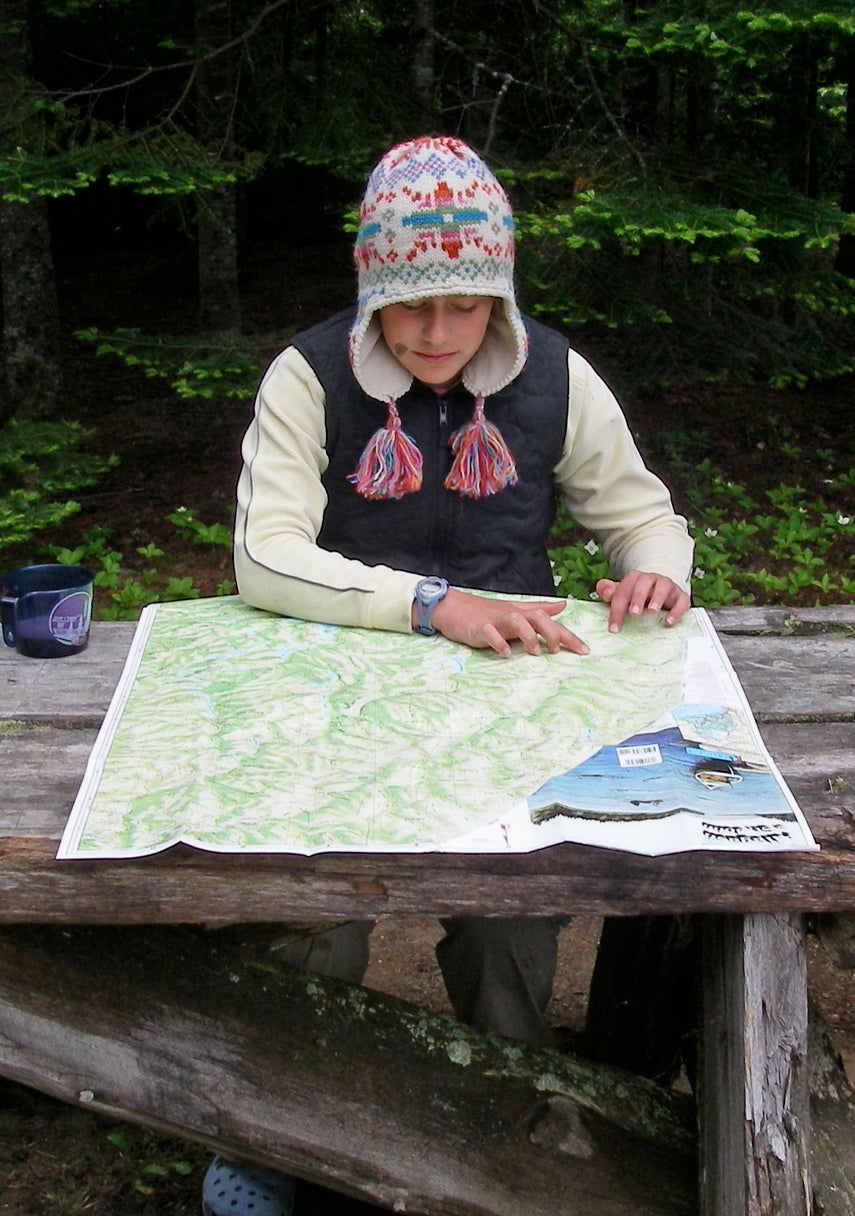I looked with dismay at our 11-year-old daughter, Molly. One eye was swollen almost shut; the other was rimmed in dried blood, the remnants of the feast of many bugs. Our eight-year-old son, Skyler, had counted 73 angry red welts on his tender white skin. Those were just the ones he could see.
“I get it now,” I said, slow to catch on, “this is why no one lives here!”
Our family of four was on Day Five of our eight-day wilderness canoe trip from the headwaters of the St. John River in northwestern Maine down to its confluence with the Allagash. My husband, Peter, was doing research for his book The Last Empty Places. The goal of the book was to explore places that are “blank” on the U.S. map. He'd defined “blank” as spots having no lights in nighttime satellite photos.
When Peter suggested the family come along, I was thrilled. I'm always looking for solid chunks of time together and a chance to get away from the distractions of city life into something simpler, maybe something that demands a different kind of resourcefulness.
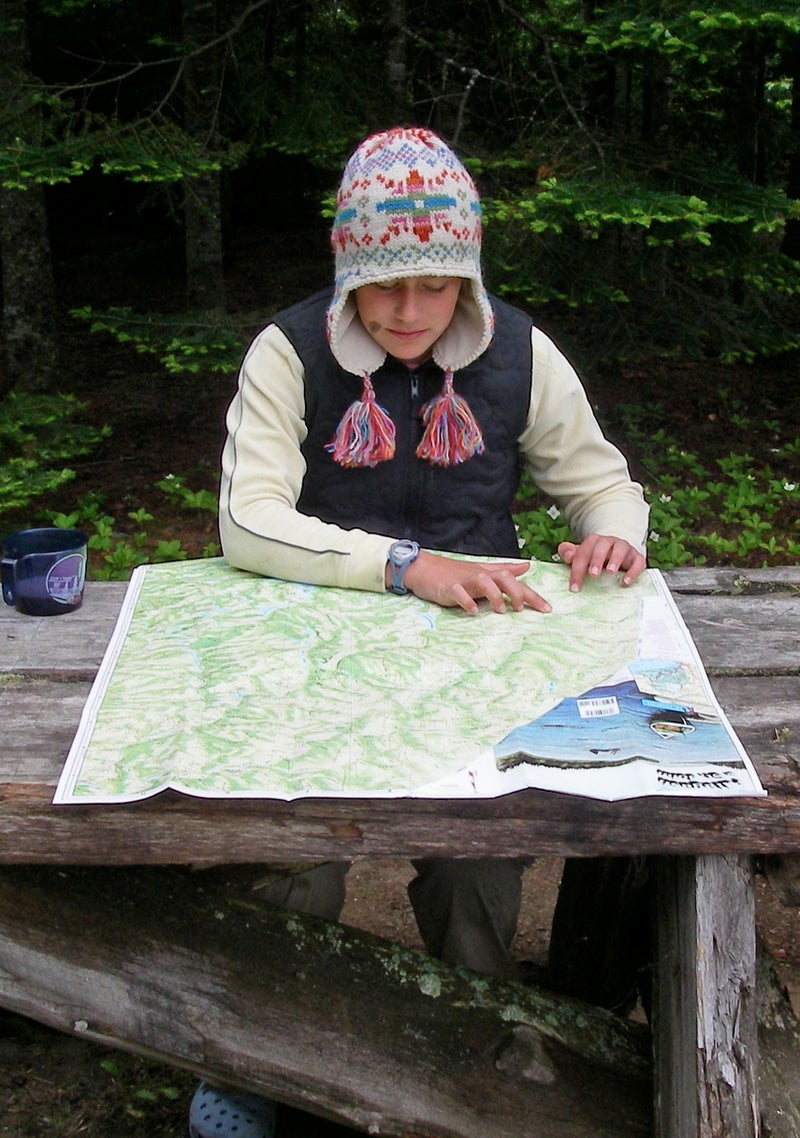
After three days of travel—12 total hours of driving, 2,492 miles of flying, and a final four-hour van shuttle over dirt roads into deep woods—we finally put in at Baker Lake. It was pouring. Sheets of rain obscured gloomy green walls of fir and spruce. We hastily pulled on rain pants and jackets and slopped through the mud, strapping dry bags and coolers into our two rented canoes.
Pushing off from the dripping shore, each kid in a bow and Peter and myself in the sterns, it was already feeling ambitious; maybe too ambitious. The village of Allagash, where we were headed and the first we would come to, lay 100 miles downstream. One hundred miles devoid of human habitation. No cell phone coverage. No exit. I had a feeling the trip was going to live up to its billing.
“Don't fohget theyah's a desahted trappah's cabin a couple of houahs downstream. It could look pretty good byah then,” shouted the shuttle driver, a jovial Mainer, stolidly holding his ground in the downpour.
Despite this unpropitious beginning, we were excited to be on the water. About ten yards wide, the shallow river slid easily over amber rocks. Within the first half hour, we rounded a bend into a young moose. Grazing at the edge of the river, he looked at us intently, as though unsure what we were, then raised his already massive head and trundled up the bank and out of sight. Two river bends later, we came upon a mother and her calf, squarely in the middle of our path. They didn't seem inclined to budge. We slowed up. They stared. We slid to the bank farthest from them. They stared; then as though saying, “You won't be so lucky next time,” slowly turned and lumbered up the opposite bank.
By the time we spied the low, mossy cabin in a small clearing it was almost dark. Thankful not to have to raise our own shelter, we dragged our canoes up the bank, hefted our dry sacks onto our backs and forced open its heavy wooden door. Unabated rain, increasing cold and a dawning realization of just how deserted this river is, was starting to feel as daunting as it was exhilarating.
Inside, the furnishings were sparse; a wood stove, an enameled washbasin and several bed frames, their exposed bedsprings topped only by thin sheaths of cardboard and a sliver of foam.
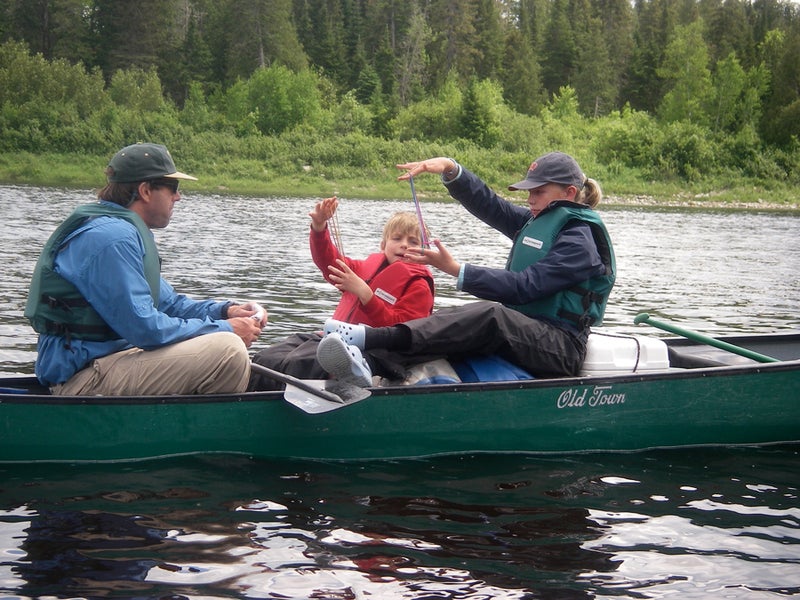
“This is great!” we exclaimed. One's standards rapidly readjust.
Skyler and Molly headed to the river for a skinny dip in the rain, while Peter and I built a fire in the stove, made hot chocolate, and prepared a makeshift pizza. Next to the door, hanging on a nail, was the faded tally from a whist game, in French. It felt as though we'd stepped into another country, another time.
“Can leaches kill you?” Skyler asked, as he and Molly burst through the cabin door, looking for our camp towels. At eight, Skyler had begun assessing his world in terms of threats. “Would I die if I jumped off this?” “Could a tornado destroy our house?”
The next day we woke to pelting rain on cedar shakes. We were not in a hurry to get back on the river. Peter wrote notes while the kids and I made pancakes. We read, we reorganized our stuff and finally pushed off by mid-afternoon. How blissful, and rare, not to have a schedule!
The rain was unrelenting, but the kids didn't seem to mind. We got what would turn into our daily fix of close encounters with moose, stumbled over slippery rocks, dragging our canoes when it got too shallow, and limped into a campsite. There are designated sites all along this stretch of the St. John. Some years earlier, The Nature Conservancy had managed to purchase eighty miles along the river from large paper companies to preserve it as the wild place it is.
While Molly and I set up the tent, trying to keep the inside dry, Peter and Skyler looked for firewood. By the time we had the pads and sleeping bags laid out—an inviting nest of down floating on air—the guys had the fire going, using a handful of birch bark as tinder; a trick Peter had learned from semi-nomadic Orochen hunters in Manchuria. To Skyler's amazement, it worked like a charm. “How could a human be complete without understanding how to create and wield fire?” Peter would later write. After a dinner of grilled steaks and s'mores we fell into our tent. Peter read aloud from Thoreau's 1840's essay on the area, Ktaadn, the kids played string games, and we fell happily asleep.
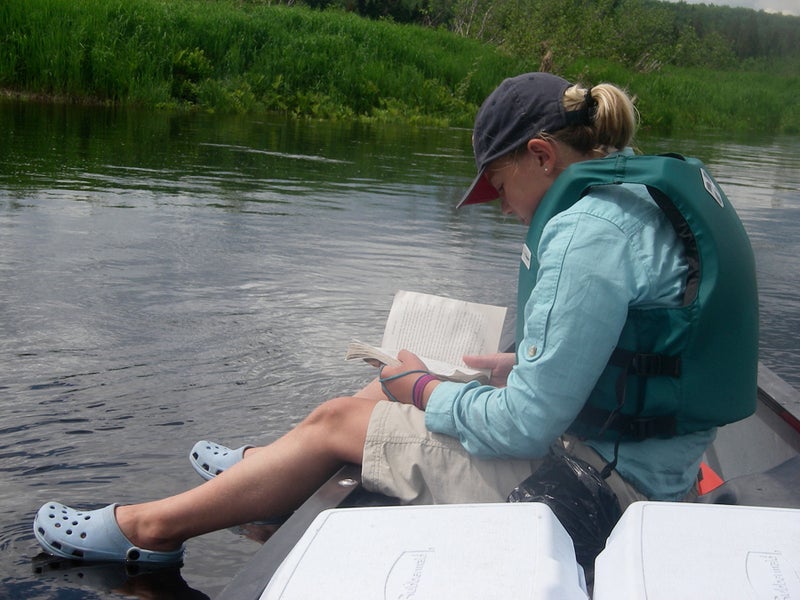
For three more days it rained and rained and rained. Each day, we unpacked and repacked our sodden tent, and got back on the swollen, grey river. Despite the miserable conditions, we were falling into a pleasant rhythm. Molly, determined to finish her book, Bridge to Terabithia, sat in the bow squinting through the rain wash. Skyler straddled the bow of his canoe and shouted out obstacles ahead, like the watch in a crow's nest.
At last, on Day Five, the sun came out. We cheered. Prematurely. Along with the sun came the bugs. An unstoppable, voracious, blood-sucking army of black flies, mosquitoes, no-see-ums seemed to rise from the forests. We tucked pants into socks; buttoned shirt cuffs; donned head nets like some kind of high-tech burka. Nothing worked. At night we tried to smoke them out with a fire. In the morning, we beat a hasty retreat to the open river. Only there, with a breeze out in the middle, could we get away.
By now, fed by the entrance of several tributaries, the river had spread to 60 yards wide and was moving faster. It braided around grassy islands that had been cleared a hundred years earlier for a logging camp replete with hotel, school, post office, and farm buildings; but they had long since melted back into earth and grass, redwing blackbirds and bald eagles, loons and geese paddling with their goslings.
Molly, who'd study the map each morning to chart our progress, was beginning to yearn—as we all were—for Allagash.
“Do you think there'll be a five-star hotel?” she asked, only half joking.
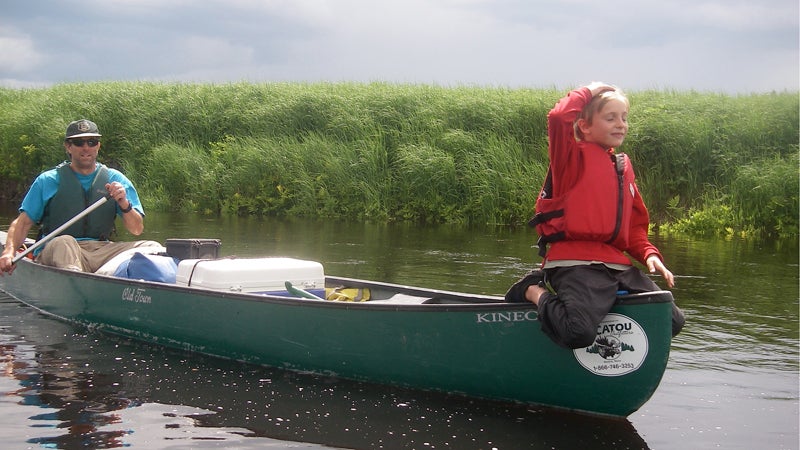
On Day Eight, we finally pulled in under the bridge in the village of Allagash. We were met by 88-year-old Evelyn McBrearity, who seemed oblivious to the halo of mosquitoes around her head. She must have seen us coming and was quick to meet the new arrivals. Her son had a bunkhouse up the bank. She offered us shelter. What could be better? A bed inside, a burger at the cafe down the road and we were in heaven.
Sometimes it seems it takes the rain, the bugs, the bare bedsprings, and fire-cooked meals to jog us out of taking all the ordinary comforts we have for granted, but also to realize we can make out fine, no happily, with a lot less. And, perhaps there are places that should be left to their natural inhabitants, places where we should be just grateful visitors.


